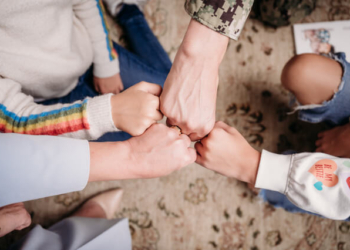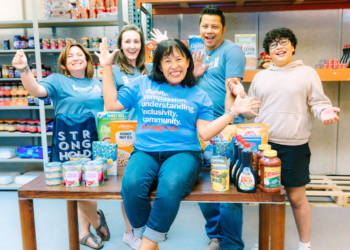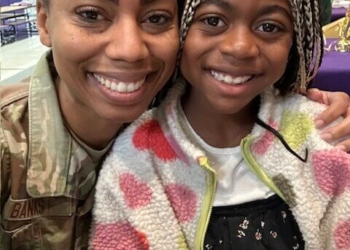Holiday spending is expected to reach an all-time high this year, raising both the profits for retailers and the stakes for families. But not everyone can afford to “keep up with the Kringles” when it comes to holiday celebrations. And, more importantly, not everyone wants to.
Many families are taking holiday matters into their own hands, devising unique traditions and rituals that enable them to maximize time together and honor what they value most.

Coast Guard spouse Loren Provoyeur, an Army veteran, tries to limit spending and keep gift-giving in check. She and her husband exchange stocking stuffers, observing both cost and size limits: Everything must fit inside the stocking and cost less than $100.
“It’s all about the little things. You apply that in your relationship, you apply it in your job — small victories or taking the little moments. That’s what we really try to focus on — little moments, little things. And the little things turn out to mean the most,” she explained.
Their stocking exchange tradition began after the birth of their daughter, a life event that had a significant impact on their finances. In addition to concerns about money, they were tiring of the pressure to find big gifts for one another. As a military family frequently on the move, they didn’t want or need extra possessions.

With a similar focus on personal values and priorities, Army wife and mother of two Amanda Sedivy says that she and her husband spend money on traveling to see family rather than buying gifts.
Over the last 10 years of their marriage, the Sedivy family has undergone four PCS moves to three different states, all of which separated them from their families. They are currently living in Georgia, several hours’ drive away from both sets of their parents.
“In lieu of presents, if we go visit [relatives] at Christmas, we ask them not to get gifts for us since we won’t be getting gifts for them; travel expenses eat into that budget,” Sedivy said.
The transient lifestyle that comes with being a military family, and the lack of control over where they move, make it difficult to spend time with loved ones. Ultimately, the Sedivy family prizes time together more than material possessions — and they want their holiday practices to support those values.
“As a family, we’re happy being with each other and we’re not really materialistic. Like my husband says, ‘Everything is just things.’”
Last year, they opened savings accounts for their children and started encouraging family members to contribute. Funds in the account can be used for experiences like trips to Six Flags or the movies when the family reunites. This enables them to spend time together and create new memories.
“Because we don’t get to see family members maybe once or twice a year, [the kids] seem to get that it’s better to spend time with somebody than to get a whole bunch of gifts… the phone calls, the video chats are only so much — it doesn’t actually replace being with somebody,” she said.

In a similar way to the Sedivy family, Joelle Cuprak and her husband, an Army couple, practice gift-giving that focuses more on experiential gifts than material ones.
In past years, for their nieces and nephews, they have bought tickets to Mount Vernon and “Disney on Ice,” as well as craft kits and educational toys like a child-sized piano. For Cuprak’s mother and father-in-law, they gifted plane tickets to Nova Scotia for a weekend stay at an inn.
“We’re still spending the money, it’s just being spent in a different way instead of just on stuff,” Cuprak said,
In addition to prizing quality time with family, they are also driven by environmental concerns.
“I’m trying to go a little bit greener with my purchases and not have so much waste … I’d rather have somebody experience something that they’ll remember and have those memories than just have a bunch of stuff just sitting there,” she said.
This year, her parents are taking the family on a cruise to Mexico. Cuprak and her brother have decided to fund an excursion on one day of the cruise. This way, the family can spend time together and share new experiences.
This may positively influence their family relationships, according to results from a study published in the Journal of Consumer Research, experiential gifts have a greater impact on strengthening relationships than material gifts.
When reflecting on her own experiences as a child celebrating Christmas with abundant gifts, Cuprak remembers a distinct feeling of disappointment. “There was always so much stuff under the tree, but it was just stuff and it wasn’t satisfying.”
While material possessions didn’t yield a lasting sense of joy for her, one unique tradition did: Her favorite part of Christmas was “Junk Night,” when her family would decorate the tree and eat cheese, chocolate fondue and appetizers.
“That tradition has just stuck … I love junk night!”
For Cuprak, it is important for her holiday traditions to be authentic and meaningful, rather than simple performances and attempts to live up to others’ holiday expectations.
“That’s what this time is for: To be with family,” she added.
Read comments







































